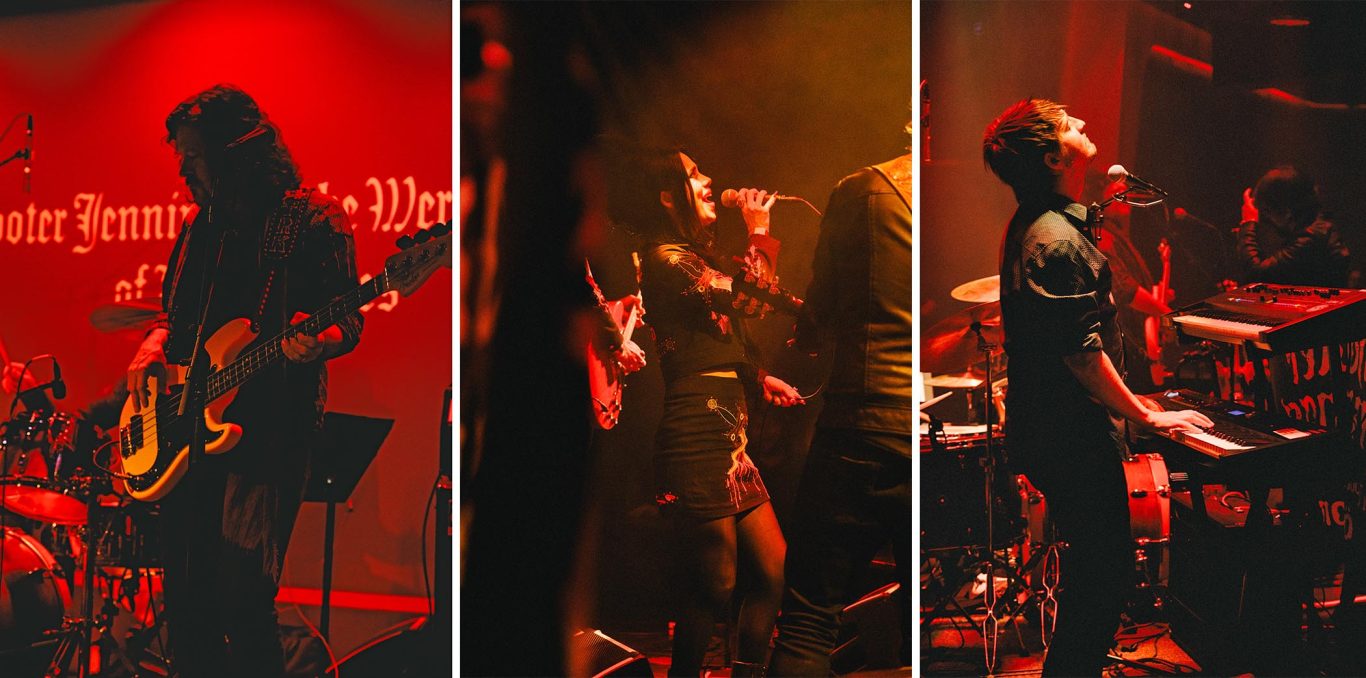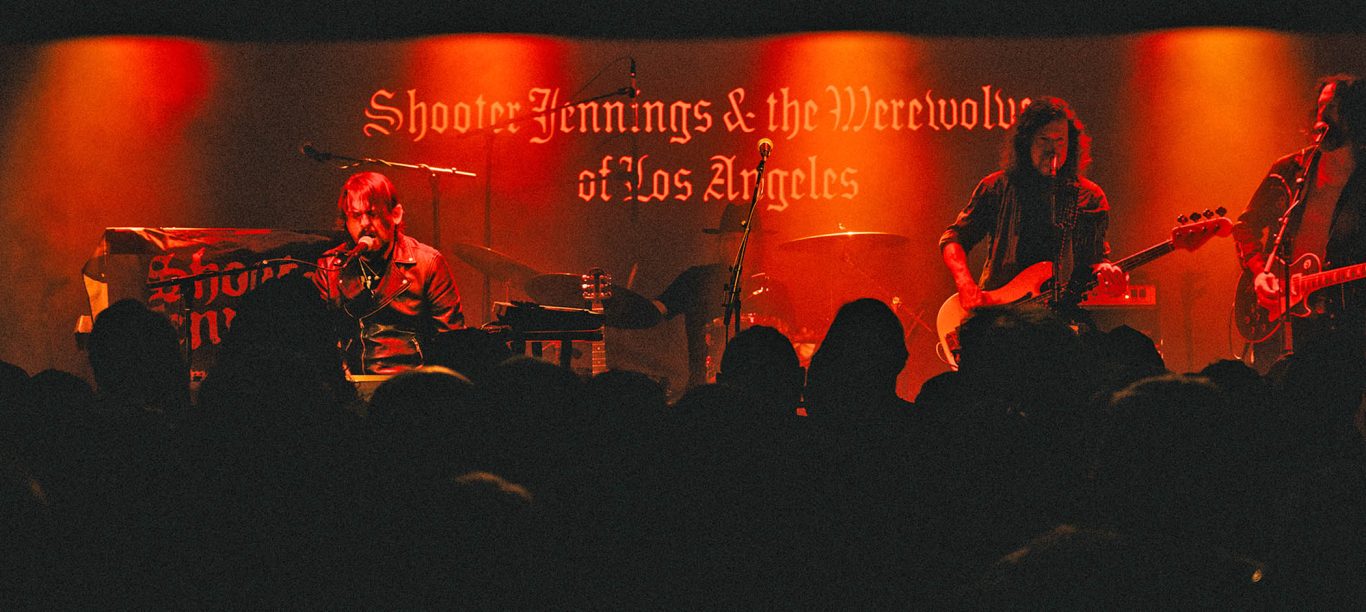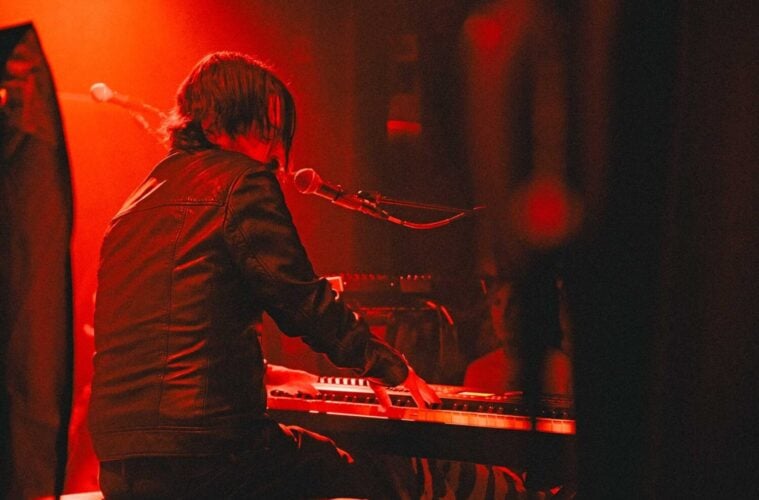Shooter Jennings honors songwriting legend Warren Zevon with a 21-song salute.
There are covers, there are tributes, and there are homages. But when Shooter Jennings took the stage with his crackerjack Werewolves of Los Angeles lineup, the frontman hollered out the evening’s raison d’être: “Let’s celebrate this motherfucker!”
In 21 songs performed one day post-Halloween, the 44-year-old progeny of Waylon Jennings and Jessi Colter did just that. The sold-out crowd at Brooklyn Made cheered as the band, with Jennings on piano, dove joyously into the marching beat of Warren Zevon’s 1978 gem “Lawyers, Guns and Money.” Past-middle-aged white guys — think gray hair, glasses, and T-shirts extolling NRBQ and Billy Joe Shaver — shouted along with every word, fists raised.
Nashville-born Jennings was in his early 20s when Zevon died, on September 7, 2003; the young musician/burgeoning producer had never seen Zevon perform, nor had he met him. But as this show, as well as the email interview I did with Jennings in October, made clear, Zevon’s picaresque hard-luck protagonists, in songs like “My Shit’s Fucked Up” and “I Was in the House When the House Burned Down,” are close to Jennings’s outlaw heart. For his part, Jennings has the talent, reverence, band, and voice to honor Zevon’s darkly poignant and sometimes delightfully twisted songs.
“I moved to Los Angeles in the year 2000, and while I knew several of Warren’s songs, and would occasionally do ‘Carmelita’ live, it wasn’t until much later that I really dove in and absorbed his body of work. I kind of discovered him through really being moved by his music and finding myself a bit through him, posthumously.”
The 500-capacity Brooklyn gig was only the third time Jennings and his Werewolves have played the Zevon set, though some of his musicians have been with Jennings for decades — and it shows. They played their first Zevon show at 2022’s Rebels & Renegades Music Festival, in Monterey, California, and the second at L.A.’s storied Roxy. The sets for all three have been similar in content and scope, with the just-released live vinyl Shooter Jennings & the Werewolves of Los Angeles Do Zevon serving up 11 (13 digitally) of Zevon’s finest from the 20-plus tracks that the quintet renders live.
Shooter Jennings’s own legacy is inescapable: He’s worked with his mom and done tons of tributes to his dad. But in Zevon, he’s clearly found a kindred spirit.
Throughout the show, the biker-jacketed, aviation-lensed Jennings switched from electric to acoustic guitar to piano and back, and brought out a sax player and other guests in service of the songs. He and his ’Wolves dug into seven cuts off Zevon’s 1978 Excitable Boy — a tour de force produced by Jackson Browne and guitarist/producer Waddy Wachtel that came out a year before Jennings was born. “Werewolves of London,” the only Top-40 hit of Zevon’s career, was, the frontman noted, “a sing along,” but in a set rife with singalongs, by far from the best or most-appreciated tune of the evening.
The simple and wrenching piano ballad “Accidentally Like a Martyr” (not on the live album, though one hopes the recording exists) was gripping, while “Nighttime in the Switching Yard,” a rollicking underrated rocker of potent power, was a funky standout. In the hands of Jennings’s capable band, it was a flashback to the cocaine-fueled ’70s of great L.A. songwriter and studio sessions, and to sweat-drenched performances on Don Kirshner’s Rock Concert and The Midnight Special. (To wit, for music nerds: Drummers Mick Fleetwood and Jeff Porcaro played on Excitable Boy; Linda Ronstadt, who had a hit with Zevon’s “Poor Poor Pitiful Me,” Jennifer Warnes, and Karla Bonoff sung on the album.)

“Roland the Headless Thompson Gunner,” the best song ever written about a vengeful headless ghost, shone in the hands of Jennings’s musical collaborators. (Jace Kartye)
Jennings is clearly a fan of Zevon’s second album (titled simply Warren Zevon), released in 1976, performing “Mama Couldn’t Be Persuaded,” the proto-Americana classic “Mohammed’s Radio,” and six others. And Brooklyn hipsters will be pleased to know that Pitchfork — a publication that launched 19 years after that sophomore album was released, scored the record a 10/10.
“The self-titled album really shook me up the first time I sat down and absorbed the whole thing. There’s not many albums I’ve heard throughout my life that, from top to bottom, really dig inside my soul and explode in my mind.”
For “Join Me In L.A.,” from that LP, Jennings brought the L.A.-based husband-and-wife duo Alexandra and Zachary James, of “Satanic Doo Wop” band Twin Temple, onstage. Alexandra dueted with Jennings, taking the part originally sung by Zevon’s one-time roommate Stevie Nicks. Jennings called Twin Temple back onstage for the final song, “Desperados Under the Eaves,” about an alcoholic who figures “if California slides into the ocean / like the mystics and statistics say it will / I predict this motel will be standing until I pay my bill.” Bukowski couldn’t have writ it better, and Zevon’s words hit home for California transplant Jennings.
“‘Desperados Under the Eaves’ and ‘The French Inhaler’ both characterize my home, Los Angeles, in such a gritty and desperate, yet mystical and beautiful way. I can sit at the piano and play ‘Desperados’ by myself and almost cry because I have felt that sadness in this town and I’ve been that person. There’s such a romanticism to it as well that it reinvigorates my love for L.A. every time I play it. I can smell it and it smells like concrete, grain alcohol and perfume.”
Shooter Jennings’s own legacy is inescapable: He’s worked with his mom and done tons of tributes to his dad. But in Zevon, he’s clearly found a kindred spirit. “Roland the Headless Thompson Gunner,” the best song ever written about a vengeful headless ghost, shone in the hands of Jennings’s musical collaborators, multi-instrumentalist Brian Whelan (Dwight Yoakum, Jim Lauderdale), drummer Luke Adams, bassist Ted Russell Kamp, and guitarist John Schreffler. With chops and energy, they managed to convey and capture, as Jennings explained:
“… [that] lonesome feeling [in] even the most biting line in Warren’s work. Getting lost in that loneliness is where the magic is. Staying true to his chords and his melodies are paramount to me because that is the music and the melodies that inspired so much of my own work. But when you see us do our version of this, it’ll certainly have an energy that we possess as a band and a spirit of celebration, rather than trying to leave a fingerprint on a masterpiece painting.”
Jennings’s Zevon show could be presented as a sit-down, multi-night, misty-eyed affair at Café Carlyle — or a drunken, shit-kicking daytime festival paired with Lynyrd Skynyrd and Bocephus. Or it could remain as it was, possibly the only time Jennings and his Werewolves will do a Zevon set on the East Coast. Given that nebulous future, some fans traveled cross-country to see Jennings do his Zevon set. Post-show, at a nearby Bushwick bar, a tattooed 40-something told me he had flown in from Detroit for the concert; he’d also been at the L.A. gig and recognized Brooklyn attendees from the Roxy performance. He professed to know every word to every Zevon song but wasn’t necessarily a fan of Jennings’s own solo work. That’s not an unfamiliar refrain for the artist.
“There were times out on the road where it was hard to tell why people were coming to see me play; half the audience would love it when I would step out and be something totally unique and the other half would be disappointed I hadn’t followed in my dad’s footsteps. But I think that my choice to move to Los Angeles at 20 was a really lucky choice for me. I couldn’t foresee the future but it allowed me to get away from Nashville and just being Waylon and Jessi’s son and create who I was.”
If Jennings’s voice, playing, and realization of Zevon’s songs are stunning, being in the spotlight doing his own material is not his ultimate goal. Though he has released wildly creative left-of-center albums, often via his own Black Country Rock label, he’s most fulfilled as a producer. In that role he elevates the artists he’s working with, including, so far, Tanya Tucker, Marilyn Manson, Avi Kaplan (of Pentatonix), and Brandi Carlile, who he also toured with. And via this live-homage set, he’s essentially elevating the songs and legacy of Zevon as a producer would.

They came out to howl. (Jace Kartye)
Indeed, Jennings made a reference that wasn’t lost on Zevon faithful: The following night, in a perfect world, Brooklyn’s Barclay Center would have seen Zevon inducted into the Rock and Roll Hall of Fame, Class of 2023. Maybe in place of George Michael? But there’s always next year. If Zevon, who made 12 studio albums before passing away at age 56 from mesothelioma, was undervalued by the masses, we have Jennings to help fix that. It’s a safe bet that whenever the need arises and the signal goes out, the Werewolves of Los Angeles will answer the call. ❖
Katherine Turman has written for Entertainment Weekly, Spin, Variety, and other publications, and is the author of Louder Than Hell: The Definitive Oral History of Metal. She lives in Brooklyn.
Editor’s note: The disclaimer below refers to advertising posts and does not apply to this or any other editorial stories. LA Weekly editorial does not and will not sell content.
Advertising disclosure: We may receive compensation for some of the links in our stories. Thank you for supporting LA Weekly and our advertisers.

